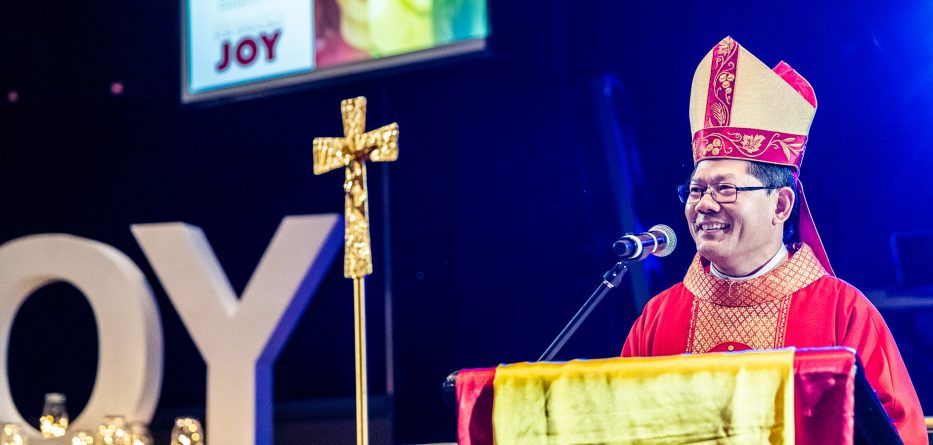Most Reverend Vincent Long Van Nguyen OFM Conv DD STL, Bishop of Parramatta
Homily for the Baptism of the Lord Year C 2019 at St Patrick’s Cathedral, Parramatta
Readings: Isaiah 40:1-5, 9-11; Titus 2:11-14; 3:4-7; Luke 3:15-16, 21-22
13 January 2019
Baptism of the Lord 2019: Baptised for a mission of announcing a new Kingdom
Dear friends,
We have entered a new year and here in Sydney, we celebrate its arrival with the most spectacular fireworks display in the world. Despite the challenges ahead, we have an innate sense that there will be a better future and that even great crises can be turned into opportunities.
As Christians, our faith in the future is rooted in the belief that God accompanies us and guides us along the pilgrim way to the Kingdom. Thus we approach the challenges around us with deep discernment, courage and willingness to change rather than fear, resistance and defence of status quo.
Transition times such as the time we Catholics are living in right now often entail chaos, uncertainty and even confusion. But we are called to go forward into the future with courage, discernment and purpose. We need to remember that times of crisis can be the favourable moments or in biblical term, the Kairos.
The Church was not at its best when it reached the heights of imperial power in what was known as Christendom. The Church was at its best when it was poor, persecuted and powerless. Consistently, we true believers are challenged to be the beacons of hope in the midst of pain, suffering and despair.
The Word of God today speaks of the Kairos moments, new beginnings and times of renewal. In the first reading, Isaiah is able to see the passing of the old and the emergence of the new. Like Noah, he anticipates what lies ahead. Amid the doom and gloom of the exile, he announces a new dawn with confidence and galvanises the people to prepare themselves for the homecoming journey.
However, the new future that Isaiah envisions does not simply consist in the exiled Jews returning to their former status in Palestine. It is not going to be a return to the past glories and securities of being the strongest nation in the region, with the monarchy, the golden temple, the festivals, the land et cetera. Rather, it will be a humble remnant people learning to be a beacon of light and a sign of God’s presence to the world. It will be a little flock gathered by the Shepherd Messiah.
The image of the shepherd gathering, holding and leading the lambs is a metaphor for the rebuilding of God’s people. The new Jerusalem after the exile will be rebuilt not with gold, power and glory but with integrity, justice, compassion and care for the poor and the vulnerable.
The prophecy of Isaiah is fitting for us as we witness the passing of the old and the emergence of the new in our own time. There is a sense in which the Church must change into a more Christlike pattern of humility, simplicity and powerlessness as opposed to worldly triumphalism, splendour, dominance and power.
Christians in the post Royal Commission are like the Jews after the exile. In so many ways, we face the monumental task of rebuilding from the ground up after the devastation of the clerical sexual abuse crisis. The future of the Church like the new Jerusalem Isaiah speaks of will not be revitalised by way of simply repeating what was done in the past. Rather, we must have the courage to do new things; we must be open to the Spirit leading us to new horizons.
In the Gospel, we are told about the time of transition. John the Baptist was the lone voice in the wilderness who spoke God’s word of truth, justice and love. Like Isaiah before him, John was able to see, hear and participate in God’s vision for humanity. He knew the Kairos: what time it was to recognise the arrival of the Messiah and make way for him.
Likewise, Jesus himself was confirmed as the Beloved of God who would bring divine purpose to fulfillment in radically self-effacing way. His baptism signals a new era where God’s revelation moves beyond old patterns, certitudes and conventions.
We can see something new and prophetic in the leadership of Pope Francis. He has called us to the whole new way of living the Gospel. Instead of holding on status quo with a business as usual attitude, he leads us in a spirit of deep conversion.
Gently but decisively, he moves us from the culture of domination to partnership and synodality, from clericalism to service, from self-reference to openness, from splendour to simplicity, from triumphalism to humility, from siege mentality to engagement, from imposing rules to accompanying with love.
Dear friends,
In envisioning a messianic future of God’s chosen people beyond the exile, Isaiah encourages them to walk into new horizons. The revelation of God in Jesus also commits us to being open and receptive to the new and different ways through which he brings to fulfilment of his Kingdom.
Thus our celebration today calls us to follow the humble and vulnerable pattern of the Beloved of God. Let us pray that guided by a future to unfold before us, we may not be afraid to embrace the unknown pathways.
May God of the journey accompany and form us into his people and his instruments for the transformation of the world. May we also baptised and beloved take up our mission in the footsteps of our Lord.








